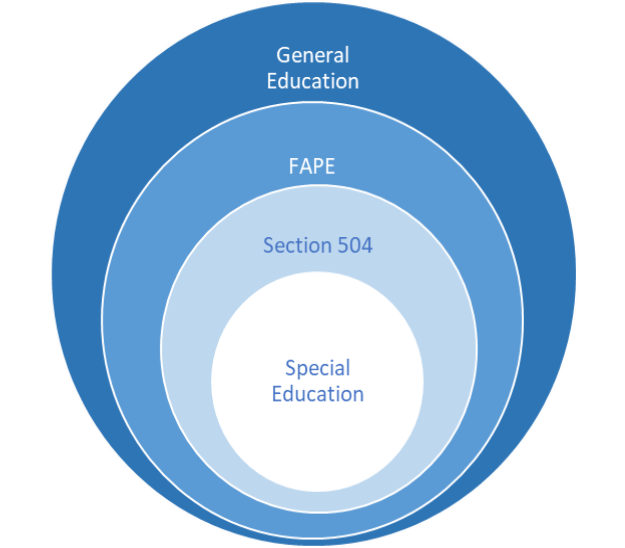CLICK HERE FOR PDF
(Updated 9/9/2025)
Free and Appropriate Public Education
Often referred to as FAPE
All school-age children with disabilities who are eligible for a 504 or an Individualized Education Program (IEP) are entitled to a Free and Appropriate Public Education (FAPE). FAPE requires students with disabilities receive the services they need to benefit from their education.
FAPE is required under the Individuals with Disabilities Education Act (IDEA), and Section 504 of the Rehabilitation Act but the details of each are different.
FAPE and 504
Under Section 504, FAPE focuses on effective services providing access. Students eligible for a 504 plan must receive educational services as effective as those their non-disabled peers receive. A 504 plan “reasonably accommodates” a student’s need order to participate in and benefit from school activities.
FAPE gives each student eligible for a 504 plan the right to educational services that:
- Are public expense and supervision
- Are no additional cost to the parents
- Meet Iowa department of education standards
- Meet the unique needs of each student
- Provide preschool-high school, ages 3-21
- Include students who have been suspended
- Include related services and supports
- Include participation in school sponsored and extracurricular activities
FAPE and IDEA
Under IDEA, FAPE focuses on a student making progress based on their own potential. IDEA requires an IEP that is written to enable a student to make progress appropriate for the student’s circumstances. The student’s IEP should provide “a chance to meet challenging objectives” which prepares for future living, learning and working.
General Education, IDEA, Section 504 and FAPE fit together
All students who qualify under IDEA are also covered under 504 because students eligible for IEP’s also meet the 504 qualification requirements. The biggest difference between IDEA and 504 is that an IEP comes with specially designed instruction.

Determining FAPE
The FAPE requirement does not guarantee successful outcomes but instead, services sufficient for the student to make progress. Information from tests, progress charts and assessments provide teams with information to help determine if a student is receiving FAPE.
When a student with an IEP is not making progress in school, the team should consider making program changes needed to ensure a student is receiving FAPE.
Listed below are essential questions that can help IEP or 504 teams make sure a student is receiving FAPE.
Essential Questions about FAPE for IEP teams
- Does this IEP includes challenging goals?
- Will this IEP assist the student in making progress?
- How will the student’s progress be measured?
- Is the student making progress towards those goals?
Essential Questions about FAPE for 504 teams
- Will this student have access to the same education and extra-curricular opportunities as other students?
- What accommodations should be provided to protect this student from discrimination?
Related Resources
- Progress Monitoring
- Six Principles of IDEA
Guidance regarding FAPE from the U.S. Department of Education
- Endrew F. Advocacy Toolkit from Understood.org